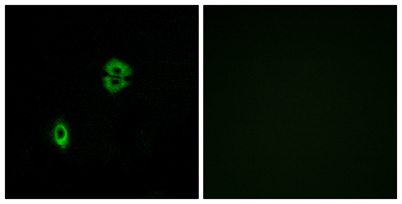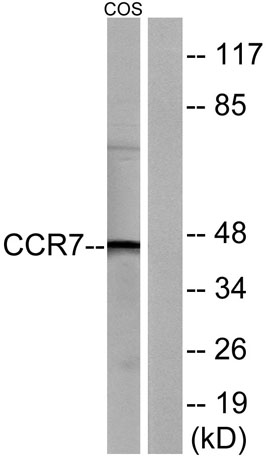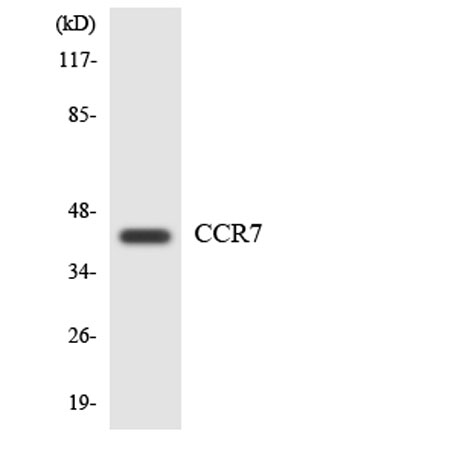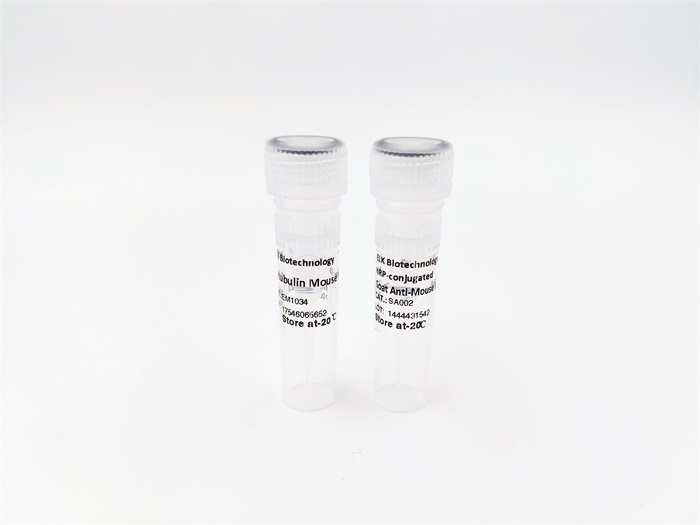









CKR-7 rabbit pAb
 One-click to copy product information
One-click to copy product information$148.00/50µL $248.00/100µL
| 50 µL | $148.00 |
| 100 µL | $248.00 |
Overview
| Product name: | CKR-7 rabbit pAb |
| Reactivity: | Human;Monkey |
| Alternative Names: | CCR7; CMKBR7; EBI1; EVI1; C-C chemokine receptor type 7; C-C CKR-7; CC-CKR-7; CCR-7; BLR2; CDw197; Epstein-Barr virus-induced G-protein coupled receptor 1; EBI1; EBV-induced G-protein coupled receptor 1; MIP-3 beta receptor; CD antigen CD19 |
| Source: | Rabbit |
| Dilutions: | Western Blot: 1/500 - 1/2000. Immunofluorescence: 1/200 - 1/1000. ELISA: 1/40000. Not yet tested in other applications. |
| Immunogen: | The antiserum was produced against synthesized peptide derived from human CCR7. AA range:170-219 |
| Storage: | -20°C/1 year |
| Clonality: | Polyclonal |
| Isotype: | IgG |
| Concentration: | 1 mg/ml |
| Observed Band: | 43kD |
| GeneID: | 1236 |
| Human Swiss-Prot No: | P32248 |
| Cellular localization: | Cell membrane; Multi-pass membrane protein. |
| Background: | The protein encoded by this gene is a member of the G protein-coupled receptor family. This receptor was identified as a gene induced by the Epstein-Barr virus (EBV), and is thought to be a mediator of EBV effects on B lymphocytes. This receptor is expressed in various lymphoid tissues and activates B and T lymphocytes. It has been shown to control the migration of memory T cells to inflamed tissues, as well as stimulate dendritic cell maturation. The chemokine (C-C motif) ligand 19 (CCL19/ECL) has been reported to be a specific ligand of this receptor. Signals mediated by this receptor regulate T cell homeostasis in lymph nodes, and may also function in the activation and polarization of T cells, and in chronic inflammation pathogenesis. Alternative splicing of this gene results in multiple transcript variants. [provided by RefSeq, Sep 2014], |
-
 Western Blot analysis of COS-7 cells using CKR-7 Polyclonal Antibody
Western Blot analysis of COS-7 cells using CKR-7 Polyclonal Antibody -
 Immunofluorescence analysis of A549 cells, using CCR7 Antibody. The picture on the right is blocked with the synthesized peptide.
Immunofluorescence analysis of A549 cells, using CCR7 Antibody. The picture on the right is blocked with the synthesized peptide. -
 Western blot analysis of lysates from COS7 cells, using CCR7 Antibody. The lane on the right is blocked with the synthesized peptide.
Western blot analysis of lysates from COS7 cells, using CCR7 Antibody. The lane on the right is blocked with the synthesized peptide. -
 Western blot analysis of the lysates from HeLa cells using CCR7 antibody.
Western blot analysis of the lysates from HeLa cells using CCR7 antibody.

 Manual
Manual